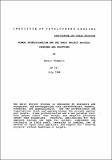| dc.contributor.author | Chambers, Robert | |
| dc.date.accessioned | 2011-02-23T10:08:37Z | |
| dc.date.available | 2011-02-23T10:08:37Z | |
| dc.date.issued | 1988 | |
| dc.identifier.citation | Chambers, R. (1988) Normal Professionalism and the Early Project Process: Problems and Solutions, IDS Discussion Paper 247, Brighton: IDS. Also paper for the conference Project Identification in Developing Countries 7–11 September 1987, Institute for Development Policy and Management, University of Manchester | en_GB |
| dc.identifier.uri | https://opendocs.ids.ac.uk/opendocs/handle/20.500.12413/162 | |
| dc.description.abstract | The early project process is dominated by engineers and
economists, and preoccupations with infrastructure, budgets,
schedules, and quantification. The way professionals and
organisations think and operate biases the process against
poor people. A new professionalism and a new paradigm start
with people rather than things, and adaptive processes
rather than blueprints. Practical implications for thls
approach include the need for calibre, commitment and
continuity in field staff, restraint in funding, use of
methods of rapid rural appraisal, and support for 'learning
projects' without deadlines or targets. | en_GB |
| dc.language.iso | en | en_GB |
| dc.publisher | Institute of Development Studies (UK) | en_GB |
| dc.relation.ispartofseries | Discussion papers;247 | en_GB |
| dc.rights.uri | http://opendocs.ids.ac.uk/opendocs/handle/123456789/80 | |
| dc.subject | Participation | en_GB |
| dc.title | Normal professionalism and the early project process: problems and solutions | en_GB |
| dc.type | Series paper (IDS) | en_GB |
| dc.identifier.blds | 11699 | |

